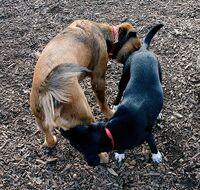Olfaction
Olfaction, or "nasal taste," is one of the six senses (along with sight, hearing, fondling, taste and humour) which lets man and some other beasts perceive and enjoy their surroundings. Olfaction puts us in touch with the most unpleasant aspect of our environment: the stink. Olfaction is inextricably bound to taste. For this reason, although we can savour fine smells, we tend to best remember the really foul ones.
How it works[edit]
The olfactory organ is the nose. This is like a cartilage penis except with an extra hole. The two of them are called nostrils, or green mines. The nose protrudes from the middle of the face and often obstructs the sense of sight.
In the air we breathe are molecules called stinkecules which, once entering the nasal cavity, are tasted by thousands of microscopic little tongue things, which then transmit to the brain the olfactory "data."
Olfaction does not always work correctly. Many people suffer from "olfactory dysfunction" (OD). Fortunately, this can be corrected using an electronic appliance that involves putting olfactory amplifiers inside the nose. New generations of these devices minimise embarrassment, as they are barely visible to others. On the other hand, patients who suffer from "olfactory hypersensitivity" are best treated with a regimen of huffing hydrocarbons.
Olfaction in men and animals[edit]
With their olfaction, animals do nearly everything: find water, sense the way home, read the p-mail, and find out who farted. The smell takes the place of a calling card.
By comparison, human olfaction is a nearly useless sense. On the rare day free of both pollen and nose hair, even if a man can sniff a smell, he is unlikely to discern its source. This is why men start brawling when one of them farts in a crowd. Whereas animals sniff nearly everything without batting an eye, some humans make a fuss any time sex doesn't have the aroma of lavender.
Different smells correspond to different emotions. For example, at lunchtime, the drooling crowd surrounding the hot dog stand is the consequence of the smell of food. This smell stimulates salivation, with which the man can sprinkle his ration before warding off other predators. Analogous, and with comparable wet effects on other glands, is the male's smell of thestinkecules of a female.
In addition to arousal, smell can coincide with reactions of terror. Throughout history, wars have been fought with catapults launching noisome amphorae filled with smells from dog fart to baby breath to rotten eggs to never-washed feet.
Facts[edit]
- An urban legend states that sommeliers have a better sense of smell than others. In fact, they merely know how to fish random adjectives from the dictionary.


